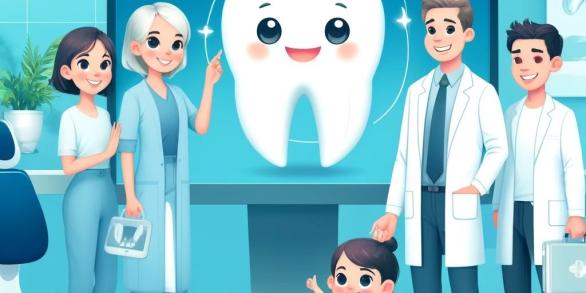We're hiring ! Join us and make a difference in our hospitals
Molar Incisive Hypomineralisation (MIH)
Summary

What is MIH?
Molar Incisive Hypomineralisation is an anomaly of the enamel that gives rise to cream, yellow or brown stains on the teeth.
These stains are the result of insufficient mineralisation of the enamel during its development, making the teeth more vulnerable to decay and hypersensitivity. MIH affects approximately 15% of children worldwide with variations depending on the geographical region. The exact causes of MIH remain to some extent unknown. Research nevertheless suggests that a role is played by a complex set of potential factors, including genetic and environmental elements and health issues during the first years of life. Severe childhood illnesses between the ages of 0 and 4, the use of medicines and of anti-inflammatory drugs in particular, as well as certain prenatal and postnatal conditions, are all seen as factors contributing to the development of MIH. The signs of MIH include discoloured and stained molars and incisives. The affected teeth can become more sensitive, especially in response to cold, heat or sugar. In severe cases the enamel can erode, leading to cavities and pain that can potentially affect chewing and speech.
Treatment
MIH is diagnosed during a thorough dental examination. A dentist is able to identify characteristic lesions of the tooth enamel and evaluate the extent of the problem. Treatment depends on the severity of the symptoms and can range from the application of fluoride varnish or dental cement to strengthen the enamel to more invasive treatment, especially if the tooth structure is seriously compromised.
Advice for parents
- Prevention and Early Detection: Make regular visits to the dentist as soon as the first permanent teeth appear for early detection.
- Oral hygiene: Encourage a strict brushing routine using fluoride toothpaste and also dental floss.
- Diet : Limit sugars and acids that can aggravate already vulnerable teeth.
- Professional treatment : Follow the dentist’s recommendations for protective or restorative treatment.
MIH is a challenge for dentists as well as for the families who are affected by it. Nevertheless, with a clear and thorough understanding, early detection and proactive management it is possible to minimise its impact on the oral health of children. Parents have a key role to play in monitoring and caring for the dental health of their children and are encouraged to act in close cooperation with their dentist to ensure the best possible follow up.